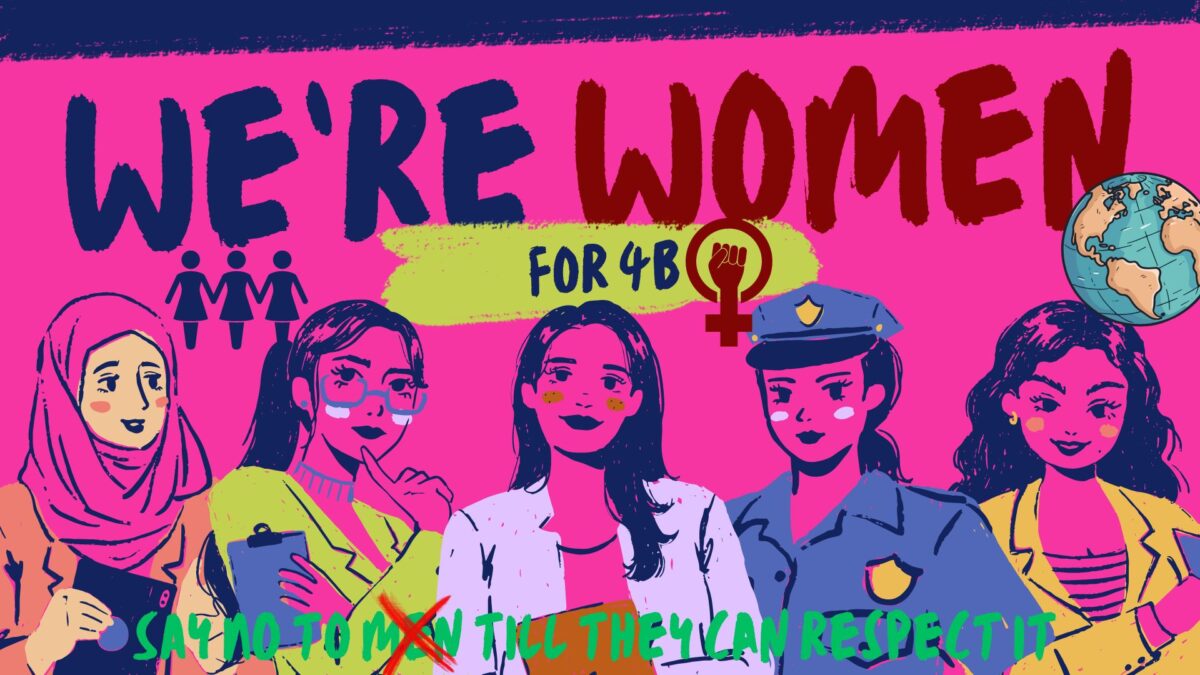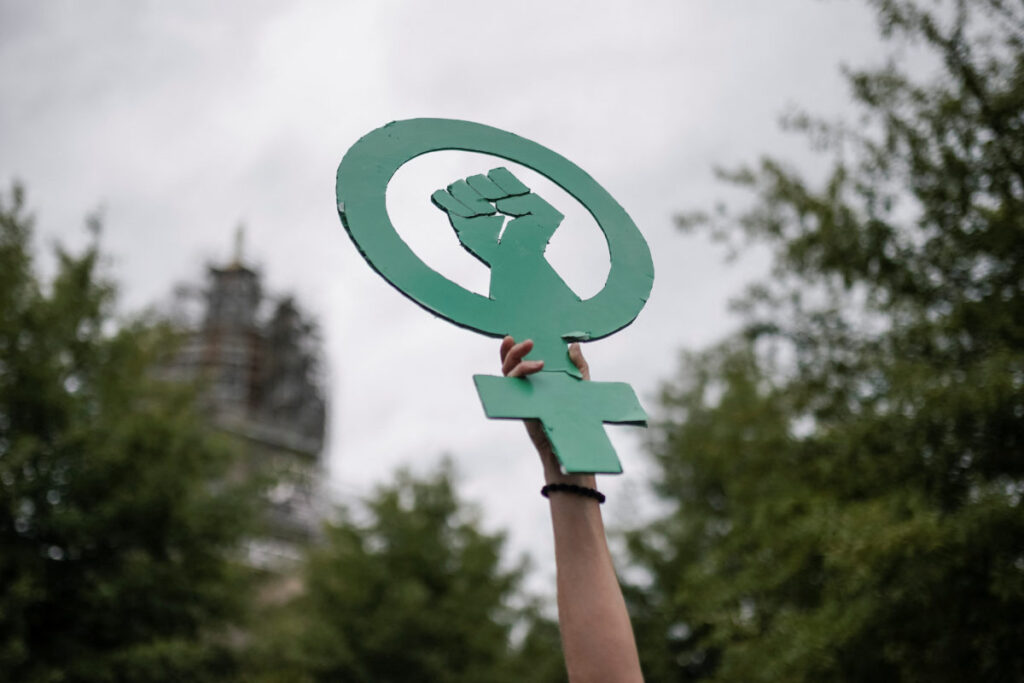4B Movement Gains Ground: Young Women Swear Off Men
- November 11, 2024
- 0
Young Women Reject Men as 4B Movement Expands A growing movement among young women in the U.S. is taking cues from South Korea’s 4B, a feminist movement that
Young Women Reject Men as 4B Movement Expands A growing movement among young women in the U.S. is taking cues from South Korea’s 4B, a feminist movement that

A growing movement among young women in the U.S. is taking cues from South Korea’s 4B, a feminist movement that urges women to reject men by abstaining from sex, dating, marriage, and children. The “4B” name comes from the Korean character “B,” shorthand for “no.” It’s a series of rejections, symbolizing resistance to traditional gender roles and male dominance. This radical stand has recently gained traction in America, with young women using social media to promote the movement’s values. Interest in the 4B movement spiked following Donald Trump’s election victory, with Google searches skyrocketing. For many young American women, the movement represents a reaction against restrictive laws on reproductive rights and a conservative political shift.
“No sex. No dating. No marriage. No children.”

The 4B movement began in South Korea in the late 2010s, where women face issues like wage inequality and gender violence. In Korea, 4B attracted a significant following among women disillusioned with traditional roles. Now, young women in America are seeing similar reasons to adopt the movement. For some, it’s a matter of refusing to engage in relationships with men who don’t support gender equality. Michaela Thomas, a 21-year-old artist from Georgia, shared her perspective: “Young men expect intimacy but oppose abortion rights,” she told The Washington Post. “They can’t have both. If they don’t support our rights, we don’t want to be with them.”
The concept of a sex strike isn’t new. In the ancient Greek play Lysistrata, women swore off sex to protest the Peloponnesian War. In South Korea, 4B became part of a larger reckoning with gender equality, as women confronted issues like wage gaps and violence. In the U.S., political divisions between young men and women are growing. According to The Financial Times, women aged 18 to 30 are 30% more liberal than men of the same age. This ideological divide has expanded since the #MeToo movement, which experts say heightened feminist values among women and prompted backlash among some men.
“4B rejects relationships that lack respect and equality.”
Platforms like Instagram and TikTok have played a huge role in spreading the 4B message in the U.S. Young women post about the movement, share quotes, and express support for ideas like rejecting relationships with men who don’t respect women’s rights. This younger generation is finding community and strength through shared values and activism, building a support network that empowers women to take a stand.
The growing interest in 4B reflects a pushback against recent changes in reproductive rights in the U.S. In states with strict abortion laws, women feel their autonomy and personal rights are under attack. For women like Michaela Thomas, 4B is a response to this political climate. Thomas explains that young women feel they can’t trust men who support restrictive policies. Experts say this isn’t just a trend; it’s a reflection of a broader ideological shift. Dr. Julia Harrington, a sociologist at UCLA, believes that the movement is an indication of women’s frustration. “Many young women see the 4B movement as a necessary resistance,” she notes, adding that some women are actively choosing to avoid relationships with men who oppose gender equality.
The movement gives young women a platform to resist inequality.
The 4B movement encourages young women to find value and purpose outside of traditional relationships. It promotes financial and emotional independence, urging women to prioritize personal growth and self-care. Advocates say the movement helps women break free from expectations to settle down, marry, or have children with partners who may not respect their autonomy. A key idea behind 4B is to challenge societal norms that pressure women into relationships. Supporters argue that women shouldn’t have to compromise their values for companionship. Dr. Harrington points out that “4B allows women to feel empowered in their independence,” which, for many, is a refreshing change from societal expectations.
The 4B movement resonates with young American women who are becoming more outspoken about their rights. Political changes, such as abortion restrictions, have fueled this activism. Women on social media have voiced their frustration with men who advocate for limiting women’s rights. This generation is actively shaping a new narrative, one that centers women’s needs and independence.
“Young women are saying no to unequal relationships.”
While 4B has gained traction, it’s also faced criticism. Some argue that it promotes a divisive approach that discourages healthy relationships. Opponents claim it alienates men and fosters hostility between genders. Critics suggest that the movement could lead to further polarization, especially among young people. However, 4B supporters believe that the movement isn’t about hate or exclusion. Instead, it’s about setting boundaries and refusing to compromise on fundamental rights. “We don’t want hostility,” said Michaela Thomas. “We want respect.”
Critics fear 4B may increase divisions, but supporters argue it’s about boundaries.
The rise of 4B in the U.S. shows that the movement’s message has struck a chord. For many young women, it represents a way to take back control, resist inequality, and demand respect. As the political landscape shifts, movements like 4B may continue to grow, especially as debates over reproductive rights and gender equality intensify. Dr. Harrington believes that 4B may evolve but will likely remain a symbol of resistance. “It’s a response to real issues women face today,” she says. Whether 4B will have a lasting impact remains to be seen, but its current momentum suggests that young women are ready to challenge the status quo.
As more young women embrace the values of the 4B movement, they redefine what it means to stand for their beliefs in a time of social and political change. The movement’s appeal lies in its message of independence and respect, encouraging women to resist relationships that don’t align with their values. For supporters, 4B isn’t just a movement; it’s a way of life that empowers women to prioritize themselves in a world that often doesn’t. Whether or not 4B becomes a long-term movement, its message is clear: women are asserting their right to choose relationships—and lives—that honor their autonomy and dignity.